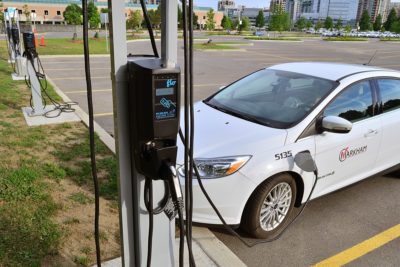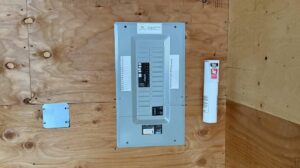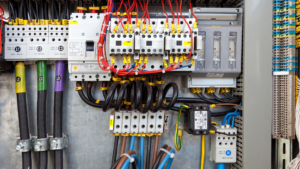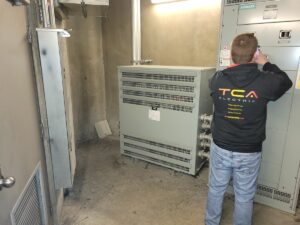As electric vehicles continue to appear on roadways in Canada, home charging solutions are becoming much more popular. Meanwhile, the selection of available electric cars has greatly diversified, with manufacturers such as Nissan, Chevrolet, and Hyundai offering popular EV models that are incompatible with Tesla charging stations. Here at TCA Electric, EV charging options have become a common point of inquiry from our customers, and for those interested in purchasing non-Tesla electric vehicles, we commonly recommend the FLO charger for home use. But what is a FLO charger, and how do you go about installing one for your home? We’re answering these questions and more in today’s blog post!
Who (or what) is FLO?

While Tesla’s supercharging network tends to grab more headlines, FLO is another major player in terms of EV charging in North America. FLO is the largest EV charging network in Canada. And while they’re based in Quebec, FLO has a strong focus on serving EV drivers throughout the country.
One major draw for FLO is their compatibility with many electric vehicles. While Tesla has made exclusivity a major part of their business strategy, the FLO charger network is compatible with a long list of popular electric vehicle makes and models, giving drivers far more options in terms of which EV model is most preferable to them. FLO offers a subscription service to use their public charging stations, and they also offer home charging solutions, which is what we’ll be discussing today.
Do I need a FLO charger for home use?
For years, the ability to fuel your car at home seemed like a dream, and regular trips to the gas station seemed like an intractable part of life. Now, however, electric vehicles offer us the height of convenience: the potential of fueling your car right at home. But do you need a FLO charger (or other EV charger) for your home? At TCA Electric, we feel that a home charging station is the right option for many drivers.
Charging speed is the main problem that a home EV charging station like the FLO charger can address. Any electric vehicle can be charged out of the box with a Level 1 charger, which is plugged into an ordinary 120-volt outlet. However, this method of charging is quite slow; while the exact rates vary depending on the model of electric vehicle, a Level 1 charger may only add around 7-8 kilometres of range per hour of charging, and even less in cold temperatures. For those who aren’t driving very often, this may be enough. For other folks, however, a Level 2 charger is a much better option, as these can typically add around 20-50 km of driving range per hour. Everyone’s situation is different, of course. But the experience and convenience of a home charging station for your electric vehicle is hard to match.
FLO charger models: The X3, X6 & X8
FLO offers three chargers: the X3, X6 and X8. When it comes to choosing the right FLO charger model for you, there are a few variables to consider. Do you want to be able to daisy-chain two or more chargers? If so, you will need the X6 or X8 model. How quickly do you want to be able to charge your vehicle? If speed is a priority, the X8 delivers 80 amps, compared to the 50 amps available in the other two models. No matter which model you choose, you will enjoy all of FLO’s signature smart features. As you weigh your options, we encourage you to check out the FLO website for a full product comparison. You will find that most of the specifications for each model are quite similar; they are all compatible with all electric vehicles and carry the same five-year warranty.
At the time of publication, the FLO Home X3 charger is priced at $599, the X6 at $749, and the X8 is the priciest at $1,399. The biggest differentiator of the X8 is its 80 amp charging power.
Where should I install a home FLO charger?
Typically, the ideal location for any EV charger is as close to where your car is most often parked as possible. For many, this is inside their garage or carport. However, another important consideration is proximity to your electrical panel. Since your home FLO charger will need to be connected to a breaker, opting for a location a bit closer to your electrical panel can lessen installation costs somewhat. Luckily, all Flo models are durable and certified to operate at temperatures from -40 to 50 degrees Celsius, so installing one in a less sheltered location—just outside your garage, for example—is still a possibility.
What is the installation process?
Some minor electrical work can be done at home by skilled DIYers; however, an EV charging installation is not such an occasion. Since installing a FLO charger involves working directly with your electrical panel, it’s a job that should only be handled by a qualified and licensed electrician. In addition to the risk of personal injury, attempting the installation as an amateur could result in mistakes that cause severe damage to your home’s electrical system.
Due to the power demands of Level 2 chargers, those with 100-amp electrical panels may first need a service upgrade to 200 amps, while those with a suite may need to look into adding a demand charge controller. Once this is done, the basic installation process is fairly straightforward: Chargers like the FLO G5 or X5 are installed by running 240 volts from an electrical panel to your preferred charging location. The cable running between the charger and its breaker will be insulated and firmly secured to prevent damage, especially lengths of the cable that need to be run outdoors. Finally, the FLO charger itself will be mounted and the new charging station will be ready.
TCA Electric: Professional FLO Charger Installation
At TCA Electric, we’re excited to be part of the up-and-coming electric vehicle market, and we’ve made it a priority to keep ourselves informed of all the charging options available to our customers. Whether it’s a FLO charger, a Tesla charger, or any other device, we’re standing by to help you make the most of your electric vehicle ownership experience with a home charging station. With years of experience installing home charging stations, we’re the expert electricians for your EV charging needs. Contact us today!




